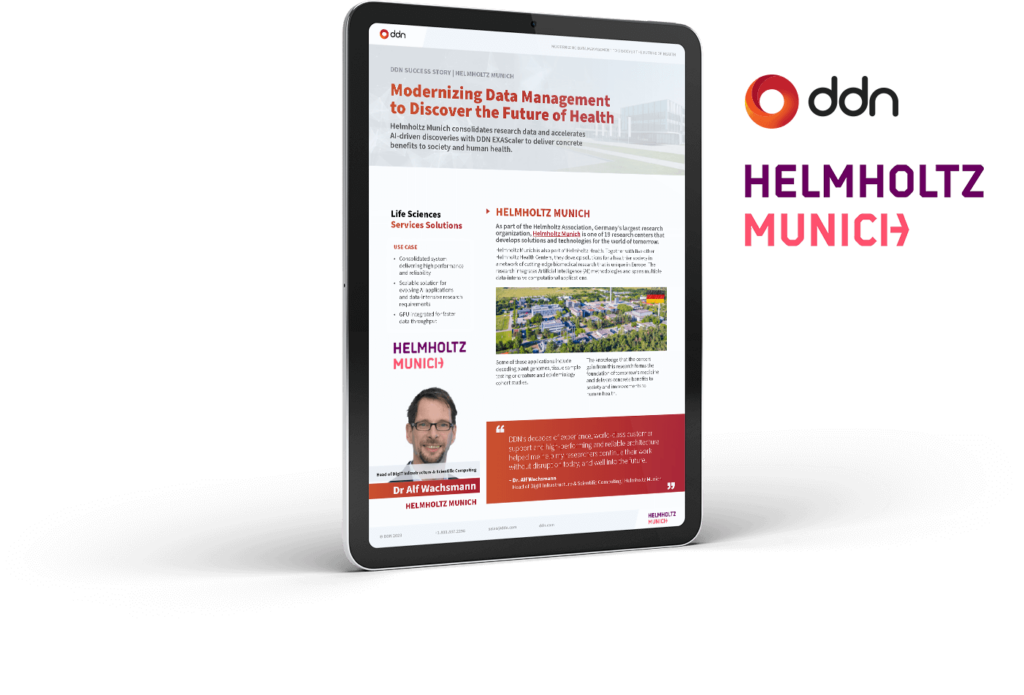Life Sciences Field Day EMEA 2023
On Demand: Life Sciences Field Day | Munich, DE 2023

On Demand: Life Sciences Field Day | Munich, DE 2023

Hosted by DDN and Helmholtz Munich in May 2023, this full-day technical event covers a wide range of topics, including analytics in life sciences, AI for clinical applications, and state of the art AI/HPC architectures for data management and storage. This in-person event also featured a tour of the Helmholtz Biorepository.
Dr. Alf Wachsmann
Head of DigIT Infrastructure & Scientific Computing
Helmholtz Munich
Dr. Alf Wachsmann opens our conference with an overview of Helmholtz Munich, their main research areas, and the facilities and services to support the Helmholtz mission.
Dr. David Ruau
Head of Strategic Alliances, Drug Discovery AI, EMEA
NVIDIA
In this session, Dr. David Ruau, PhD, explores the paradigm shift of Generative AI in the healthcare industry. NVIDIA has been pushing the limit in this domain since a decade from the hardware level to AI models. NVIDIA recently released BioNeMo a product aimed at helping researchers in industry and academia train and use AI models.
Filip Nollet
Head of Seeds R&D Informatics Dev Ops
BASF Agricultural Products
Filip Nollet shares his experiences of how Data Management architectures have evolved and scaled in Next Generation Sequencing.
Panel speakers include:
Dr. David Ruau, NVIDIA
Filip Nollet, BASF Agricultural Products
Dr. Alf Wachsmann, Helmholtz Munich
Manousos Markoutsakis, DDN
Moderated by Paul Wallace, DDN
Our morning panel session explores Generative AI, AI Maturity, AI Explainability, and Prompt Engineering.
Prof. Dr. Fabian Theis
Director of the Institute for Computational Biology
Helmholtz Munich and Technical University of Munich
Professor Doctor Fabian Theis conducts research in the field of computational biology, with the main focus of his work on the application of machine learning methods to biological questions. In this session, he looks at research areas such as building a Human Cell Atlas using deep representation learning, and the move towards personalized medicines.
Valentin Plugaru
Chief Technology Officer
LuxProvide
LuxProvide’s mission has been to build and promote trusted environments, ensuring a safe use of its platforms for sensitive applications. In this session, Valantin Plugaru will focus on key design choices implemented in LuxProvide’s MeluXina supercomputer that can enhance adoption of its facilities by projects in the life sciences domain.
Dr. Robert Esnouf
Director of Research Computing, Wellcome Centre for Human Genetics
University of Oxford
In this session, Dr. Robert Esnouf shares his experiences of supporting multiple research teams, including the organisational and architectural decisions needed to support clinical research data at scale.
Dr. Anna Lena Eberle
Product Manager
Carl Zeiss MultiSEM GmbH
Scanning electron microscopy has become a standard method for 3D tissue volume-imaging, however, for large-scale experiments, fast acquisition workflows are needed. The multibeam SEM from ZEISS scans the sample with 91 electron beams in parallel, thereby massively increasing image data throughput. Dr. Anna Lena Eberle gives an overview of the high-throughput serial section image acquisition workflow with the ZEISS MultiSEM.
Dr. Tingying Peng
AI Group Leader
Helmholtz Munich
Dr. Tingying Peng leads a group which creates new AI methods to help life scientists and pathologists analyze microscopic images more quantitatively and efficiently, allowing them to extract more knowledge. Her group works on both classic microscopy modalities, such as bright-field/histological and fluorescence microscopy, and advanced tools, such as Cryo-electron tomography (Cryo-ET), light-sheet microscopy and extended depth-of-field (EDOF) microscopes with “Electrically Tunable Lenses”.
Bom Singiali
HPC Team Lead
Helmholtz Munich
In this session, Bom Singiali shares the HPC systems architecture and resources available to support AI and machine learning at Helmholtz Munich, including NVIDIA and DDN EXAScaler technologies and supported applications for AI workloads.
Dr JT Acquaviva
Research Team Leader
DDN
Dr. JT Acquaviva explores the trends and challenges which we need to address in Life Sciences, including complex data management issues, large data volumes for emerging applications, and the need for clearer governance and compliance for clinical and health data and “ethical” AI – and how this translates into technology and infrastructures for real-world applications.
Panel speakers include:
Dr. Tingying Peng, Helmholtz Munich
Dr. Anna Lena Eberle, Carl Zeiss MultiSEM GmbH
Dr JT Acquaviva, DDN
Moderated by Paul Wallace, DDN
Our closing panel session explores Foundation Models, AI models as Digital Assets, Breakthroughs in image processing with AI.

Modernizing Data Management to Discover the Future of Health. Helmholtz Munich consolidates research data and accelerates AI-driven discoveries with DDN EXAScaler to deliver concrete benefits to society and human health.
We’re here to help with all your data storage and management needs. Contact our experts for personalized support and tailored solutions.
Contact Us